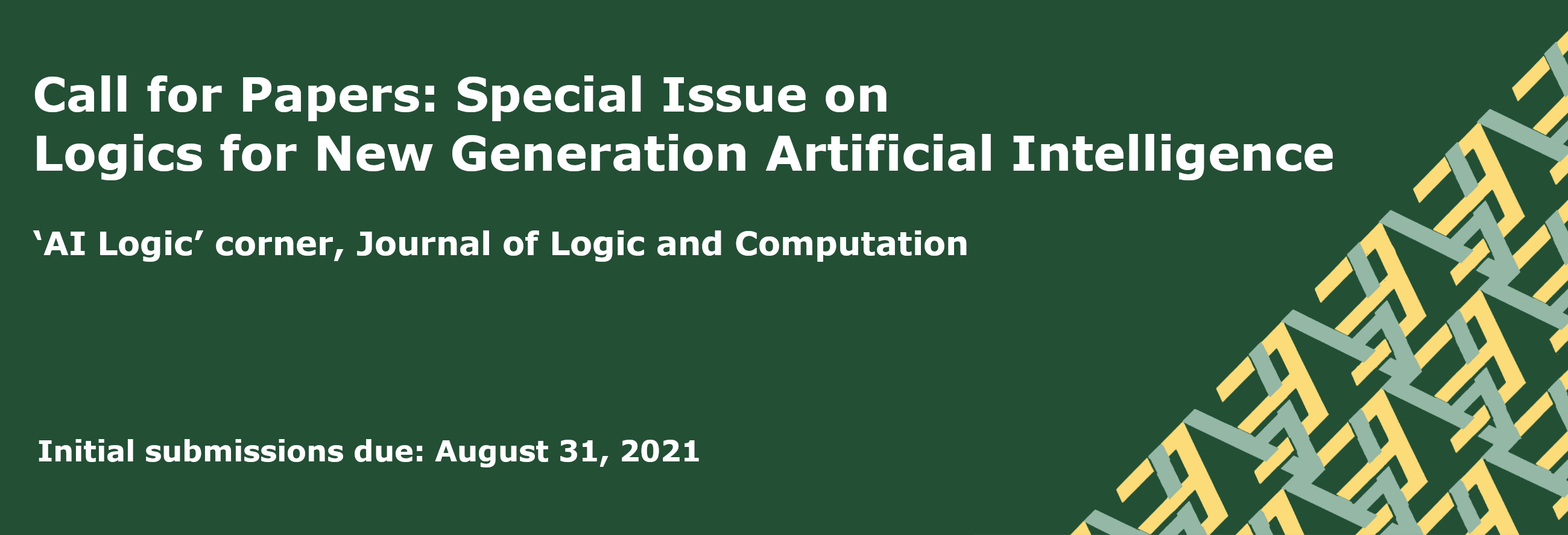CFP: Special Issue on Logics for New Generation Artificial Intelligence, ‘AI Logic’ corner, JLC
Call for Papers: Special Issue on Logics for New Generation Artificial Intelligence
‘AI Logic’ corner, Journal of Logic and Computation
Initial submissions due: August 31, 2021
In an open, dynamic and real environment, logic is an essential tool to build various sophisticated models to enable machines to make rational decisions, to provide effective explanations for human beings, and to ensure that machines behave ethically and legally. It must be combined with Big Data and machine leaning techniques that have been widely used in various forms of a new generation artificial intelligence, such as big data intelligence, swarm intelligence, cross media intelligence, man-machine hybrid enhanced intelligence and autonomous intelligence systems.
The main objectives of the new ‘AI Logic’ corner of the Journal of Logic and Computation are to develop theories and techniques of non-monotonic logics and formal argumentation and apply them to causal reasoning, knowledge graph reasoning, and reasoning about norms and values, in an open, dynamic and real environment. In line with these objectives, a project titled “Research on Logics for New Generation Artificial Intelligence” (LNGAI, 2021-2025) was granted as a major project of the National Social Science Foundation of China in 2020.
This project is in turn associated with an annual workshop, called International Workshop on Logics for New Generation Artificial Intelligence (LNGAI). The first workshop, LNGAI 2021, will take place in Hangzhou on 18-20 June 2021. https://www.xixilogic.org/events/lngai2021/
In connection to LNGAI 2021, this special issue will invite some submissions selected and extended from the papers presented in the workshop. Meanwhile, any other submissions relevant to the `AI logic’ corner are welcome.
Topics include but are not limited to the following:
– Argument mining
– Answer set programming
– Autonomous agents and multi-agent systems
– Causation/Causal inference
– Commonsense reasoning
– Conditional logics
– Connection between machine-learning and causal inference
– Default logics
– Deontic logic
– Description logics
– Ethical approaches
– Explanation in AI and law
– Formal argumentation
– Graphical causal models/Bayesian networks
– Human-agent explanation
– Knowledge graphs
– Knowledge graph embedding
– Legal argumentation
– Logic-based AI platforms
– Logics in AI applications
– Logics for ethical AI
– Logics for explainable AI
– Markov logic network
– New logics for AI
– Nonmonotonic logics
– Reasoning about Norms and values
– Reasoning about actions and change
– Reasoning about knowledge graphs
– Subgraph reasoning
– Uncertain reasoning
All submissions must comply with the submission guidelines of Journal of Logic and Computation (https://academic.oup.com/logcom/pages/General_Instructions) and will be peer reviewed.
Editors of this special issue:
Beishui Liao, Zhejiang University (‘AI Logic’ corner editor, baiseliao@zju.edu.cn)
Fenrong Liu, Tsinghua University (guest editor, fenrong@tsinghua.edu.cn)
Leendert van der Torre, University of Luxembourg (‘AI Logic’ corner editor, leon.vandertorre@uni.lu)
Yi Zhou, Shanghai Center for Brain Science and Brain-Inspired Technology (guest editor, yzhou@bsbii.cn)
《逻辑与计算》杂志,“人工智能逻辑”专栏
投稿截止日期:2021年8月31日
在开放、动态和真实的环境下,为了使得机器能够作出理性决策,为人类提供有效解释,并确保机器行为能够充分满足人类伦理和法律方面的要求,逻辑学作为建构复杂模型的工具是必不可少的。在大数据、云计算和机器学习等技术的推动下,大数据智能、群体智能、跨媒体智能、人机混合增强智能、自主智能系统等新一代人工智能技术取得不断发展,但也面临重要问题。为了让逻辑学能在上述重要方向发挥作用,必须把它与大数据和机器学习等前沿信息技术有机融合起来。
在这样的背景下,《逻辑与计算》新近开设 “人工智能逻辑”专栏(AI Logic corner),恰逢其时。它旨在促进经典非单调逻辑、形式论辩等人工智能逻辑核心方向的发展,并探索开放、动态和真实环境下的因果推理、知识图谱推理、规范与价值推理等新一代人工智能重要推理方向的建模和应用。这些目标与国家社科基金重大项目“新一代人工智能驱动的逻辑学研究”(2021-2025)完全吻合。与该项目相联系,“新一代人工智能逻辑国际研讨会”计划每年召开一次。首届会议将于2021年8月18-20日在杭州召开。
与“新一代人工智能逻辑国际研讨会”相联系,本次专刊欢迎在该会议上陈述的经过扩展的高质量论文。同时,也欢迎与“人工智能逻辑”专栏相关的其他投稿。
备注:《逻辑与计算》(Journal of Logic and Computation)杂志是由牛津大学出版社出版的逻辑学领域的国际知名SCI期刊。
专刊编辑
廖备水:浙江大学 教授(baiseliao@zju.edu.cn)
刘奋荣:清华大学 教授(fenrong@tsinghua.edu.cn)
Leendert van der Torre:卢森堡大学 教授(leon.vandertorre@uni.lu)
周熠:上海脑科学与类脑研究中心 研究员(yzhou@bsbii.cn)

